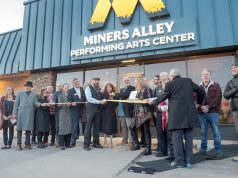
For 35 years, Philip Sneed has been hearing that the theater
is dying as quickly as its gray-haired audience.
“And if that were true 35 years ago, then the theater would
be dead by now,” says Sneed, the producing artistic director of the Colorado
Shakespeare Festival.
Despite these statements, the timeless nature of
Shakespeare’s plays has continued to draw generations of new patrons of the
theater.
“I think for many people, an interest in certain things,
whether it be theater or poetry or fine wine or gardening or religion or
whatever, there are certain things people aren’t necessarily drawn to when they
are younger and they are drawn to as they age,” Sneed says. “And theater, to
some extent, is one of those things.”
The Colorado Shakespeare Festival is kicking off its 54th
annual season with four plays, two of which are written by Shakespeare.
Performances range from classic — with Shakespearean plays The Comedy of Errors and
Romeo
and Juliet, to bilingual — with special performances of The
Government Inspector in the comedy’s native Russian language.
The festival opens with a matinee of The Little Prince
on Saturday, June 25 at the University Theater, with a performance of Romeo
and Juliet at the Mary Rippon Outdoor Theatre leading opening night
later in the evening.
Though the reference to Shakespeare in the festival’s title
indicates an adherence to the master playwright, it is not unheard of to
showcase other more contemporary plays that are influenced by Shakespeare.
“He is the most produced playwright in the world today, so I
think it’s reasonable to assume that most playwrights who write after
Shakespeare’s time were in some way influenced by Shakespeare,” Sneed says. “So
it’s about putting the work in context. The same is true of a Mozart festival
or a Bach festival. You have these great artists whose art stands at or near
the top of their field, and it’s the standard by which I think most people in
the field today measure themselves.”
Sneed says he finds Shakespeare to be at the heart of
theater and playwriting because of his complete understanding of the human
condition.
“What he understood about human emotion — about love, about
greed, about power, about ambition — all of those things, human nature hasn’t
changed. And he found ways to articulate that as well or better than anyone has
before or since.”
While the themes of Shakespeare’s plays are classic and his
language and verse is beautiful, they are still dated. Sneed says he finds that
a skilled actor can help the audience move past the aged nature of
Shakespeare’s language to showcase the relationships between characters.
“Romeo and Juliet are teenagers in love — and as long as the
actors are able to convey that, they can be speaking French, or they could be
speaking Spanish,” Sneed says. “You could still get what they’re feeling toward
each other. So even without the words, a good actor can convey that emotion and
that human desire and that human need. “
Similar to its namesake, the Colorado Shakespeare Festival
is a long-standing staple in the local theater community. Age-wise, Boulder’s
festival is second only to the Oregon Shakespeare Festival, which has been
around since 1935. The Colorado Shakespeare Festival became an official
organization in 1958, but Shakespearean theater has had a presence in the
campus community since 1898.
The Colorado Shakespeare Festival’s history did not leave it
immune to the economic recession. The budget for the Colorado Shakespeare
Festival is approximately $1.4 million. Between 2007 and 2009, expenses
exceeded revenues by a total of $950,000, Sneed says. The Colorado Shakespeare
Festival is a program under the College of Arts and Sciences, and the College
of Arts and Sciences intervened to provide funds to help sustain the festival.
The Colorado Shakespeare Festival balanced the budget in its
2010 season, and is on track to maintain that balance in 2011. The festival has
budgeted $50,000 devoted to replenishing the funds the College of Arts and
Sciences passed on to the festival.
The festival has restructured its programming to help save
money in a variety of ways. Rather than having two performances going at once,
as was typical in the past, the festival instead will be showcasing one
performance at a time, which saves money by requiring less manpower.
“That is a big money saver because it allows us to cut down
on the number of people we’ve hired,” Sneed says.
The Colorado Shakespeare Festival has not sacrificed the
elegant nature of the theater to adapt to the demands of the new media
landscape.
“There is something about the live experience [that] the
media experience will never ever, ever replace,” Sneed says. “And that’s simply
that there’s an energy that is shared between people that are in the same room
together at the same time. There is nothing like that. Nothing Steve Jobs at
Apple or Bill Gates at Microsoft will ever create will replace that live
experience.”














